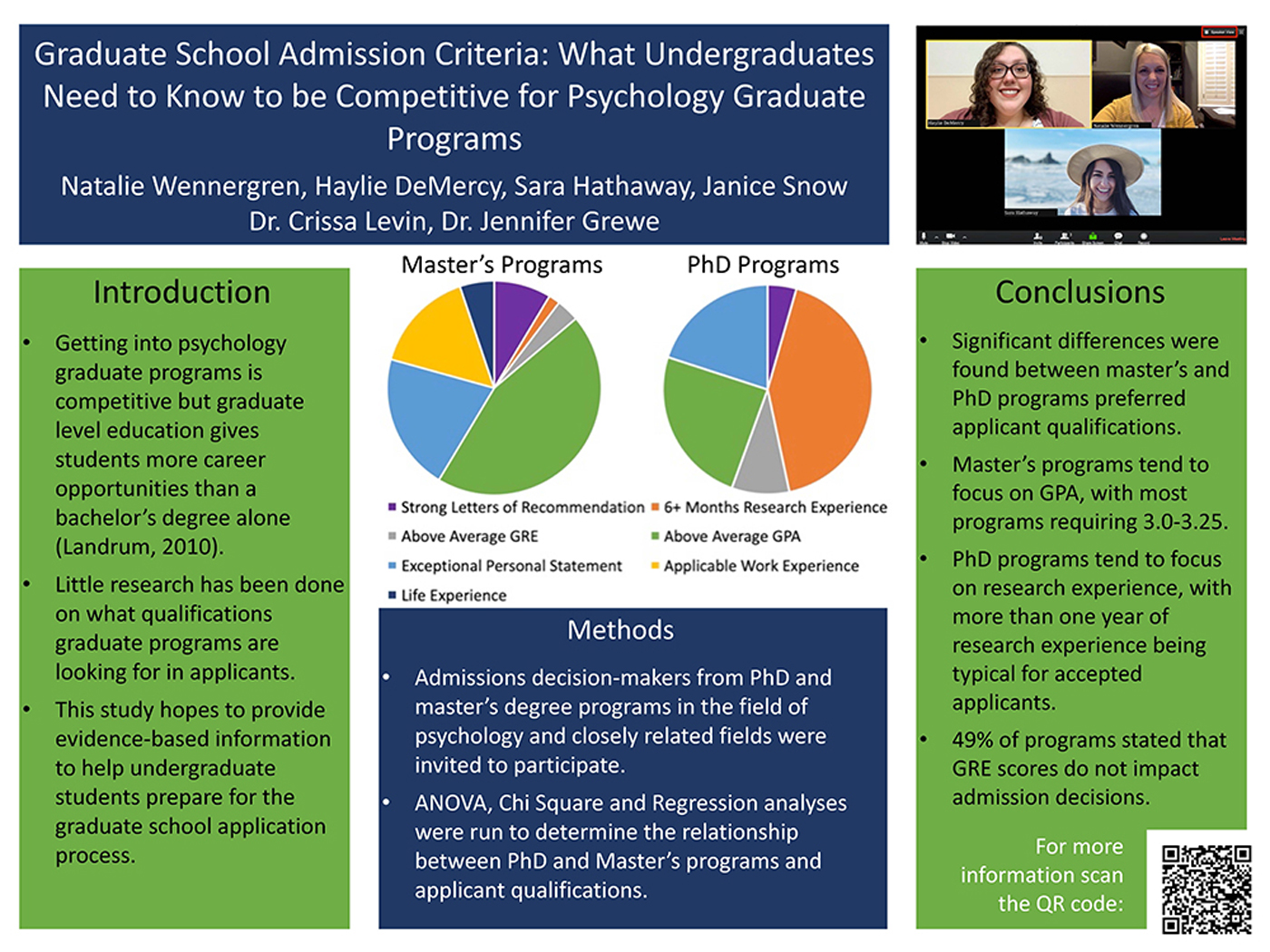Graduate School Admission Criteria: What Undergraduates Need to Know to be Competitive for Psychology Graduate Programs

Abstract
Graduate programs in psychology are competitive, but can give psychology students more career opportunities than a bachelor’s degree alone (Landrum, 2010). Many psychology undergraduates who wish to attend graduate school are unsure which qualifications Department Chairs and admissions committees are looking for and what they should focus on prior to applying to graduate school. Previous research has shown that applicants to graduate school in psychology-related fields are more likely to be accepted if they have strong letters of recommendation, at least 6 months of relevant research experience, higher-than-average GRE scores, higher-than-average GPA, exceptional personal statements, applicable work experience, and more life experience in comparison with other applicants (Littleford et al, 2018, Pashak et al., 2011). This study will examine the potential impact of each of these variables on admission to graduate programs. Department Chairs and admissions committees of master’s, PsyD and PhD psychology programs throughout the United States will participate through a Qualtrics survey.
Keywords: graduate school, admissions, psychology graduate programs
Graduate School Admission Criteria: What Undergraduates Need to Know to be Competitive for Psychology Graduate Programs
Hypothesis
We hypothesize that there will be a significant difference in preferred applicant qualifications between master’s and PhD programs. We also hypothesize that there will be a significant difference in preferred applicant qualifications between program types: Clinical, Counseling, School, Industrial/Organizational, Developmental and Social Psychology.
Data Analysis
G*Power was used to estimate the appropriate sample size for comparing groups using an ANOVA, Regression, and Chi Square. Applicant qualifications will be analyzed against the independent variable, level of degree programs, which includes Master’s, Ph.D. and PsyD. Analysis will also be examined against program emphases within the field of psychology which include: Clinical, Counseling, School, Industrial/Organizational, Developmental and Social Psychology. ANOVA, Chi-Square and Regression analyses will be run to determine the relationship between the independent variables and the dependent variables, applicant qualifications. Analyses will determine whether there is an association between variables and whether a significant difference exists between variables.
Results
Some significant differences were found between Master’s and PhD programs preferences for different applicant qualifications.
- Research experience is significantly more important for students who are applying to PhD Programs than those who are applying to Master’s programs. Most PhD programs prefer applicants to have a combination of publications and presentations, or at least 1 presentation. Most Master’s degree programs stated that it is not typical for applicants to have any presentations or publications.
- While the majority of Master’s programs reported that an above-average GPA is the most important qualification for an applicant to have, PhD programs typically require a higher GPA than Master’s programs do for admission. Most Master’s degree programs that we surveyed prefer applicants to have a 3.0-3.25 GPA, while most PhD programs reported that an applicant should have between 3.5-3.75 GPA.
- 39% of all programs stated that it is only slightly important for applicants to have a higher-than-average GRE score in order to be accepted, and 38% stated that GRE score is not at all important. PhD programs who do take the GRE into account reported that a score between 300-400 is preferred. The majority of Master’s programs stated that the GRE score does not impact admission decisions.
Results comparing applicant qualifications against program type are being analyzed and will be reported upon completion.
References
Landrum, R. E. (2010). Intent to apply to graduate school: Perceptions of senior year psychology majors. North American Journal of Psychology, 12(2), 243–254.
Littleford, L. N., Buxton, K., Bucher, M. A., Simon-Dack, S. L., & Yang, K. L. (2018). Psychology doctoral program admissions: What master’s and undergraduate-level students need to know. Teaching of Psychology, 45(1), 75–83.
Pashak, T. J., Handal, P. J., & Ubinger, M. (2012). Practicing what we preach: How are admissions decisions made for clinical psychology graduate programs, and what do students need to know? Psychology, 3(1), 1–6.

